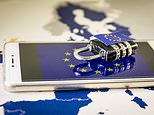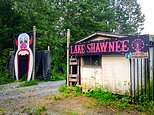
The new entry-exit border check system came into force over the weekend across Europe.
The digital system began on October 12 for arrivals into the EU.
It will require non-EU passport holders and those crossing Schengen borders to provide biometric data and fingerprints.
Passengers will need to scan their passports from now onwards at an automated self-service kiosk.
The system replaces passport stamping for visitors to Europe’s Schengen area, and is being rolled out slowly over the next six months.
It will register the person’s name, type of travel document, biometric data (such as fingerprints) and the date and place of entry and exit.
However, certain travellers will be exempt from the rules.
A full list of those who do not need to follow the EES travel rules has been revealed…
The new entry-exit border check system came into force over the weekend across Europe
Nationals of the European countries using the EES, as well as Cyprus and Ireland, will be exempt, according to the EU’s official website.
Also exempt are non-EU nationals who hold a residence card and are immediately related to an EU national.
Non-EU nationals who hold a residence card or a residence permit and are immediately related to a non-EU national who can travel throughout Europe like an EU citizen are on the list.
As are non-EU nationals ‘travelling to Europe as part of an intra-corporate transfer or for the purposes of research, studies, training, voluntary service, pupil exchange schemes or educational projects and au-pairing’.
Holders of residence permits and long-stay visas do not have to follow new rules.
Neither do nationals of Andorra, Monaco and San Marino and holders of a passport issued by the Vatican City State or the Holy See.
People exempt from border checks or who have been granted certain privileges with respect to border checks (such as heads of state, accredited diplomats, cross-border workers) do not have to follow the rules.
Diplomats travelling on short stay may be exempt from EES registration under certain conditions.
A full list of those who do not need to follow the EES travel rules has been revealed
The exception from registration in the EES also applies to members of the armed forces travelling on NATO or Partnership for Peace business.
Also free from the rules are people not required to cross external borders solely at border crossing points and during fixed opening hours, as well as people holding a valid local border traffic permit.
Crew members of passenger and goods trains on international connecting journeys do not have to abide by the rules.
Nor do people holding a valid Facilitated Rail Transit Document or valid Facilitated Transit Document, provided they travel by train and do not disembark anywhere within the territory of an EU Member State.
Share or comment on this article:
Revealed: Full list of travellers exempt from new entry-exit system rules
Source link
CHECK OUT: Top Travel Destinations
READ MORE: Travel News



